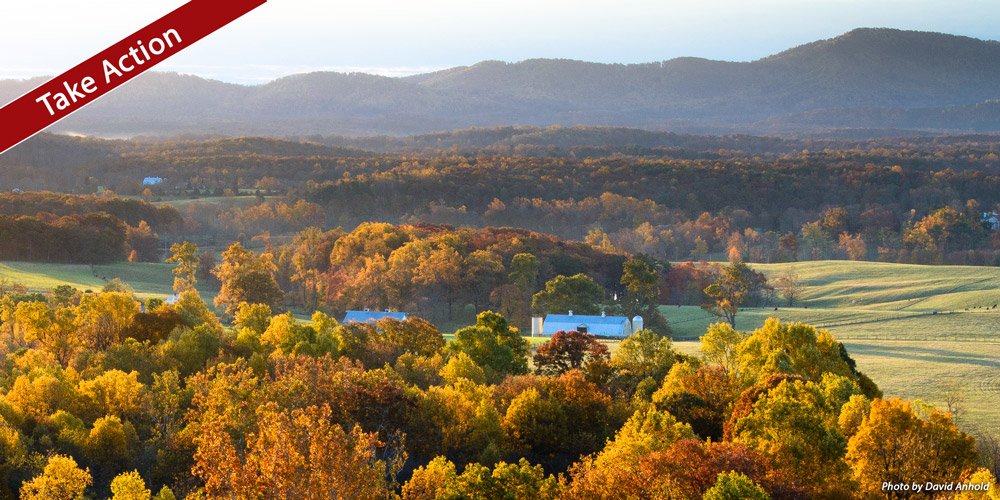
Preserving farmland and protecting the water we drink is critical to quality of life. To that end, we want to alert you to important budget amendments being considered by the Virginia General Assembly. These amendments address insufficient funding for natural resource protection.
Some amendments are in the Senate Finance Subcommittee on Economic Development and Natural Resources, others are in the House Appropriations Subcommittee on Commerce, Agriculture, Natural Resources & Technology. Full background on the amendments and the programs they fund can be found below.
Please reach out to your state elected officials today and let them know that funding for conservation and agricultural best management practices is important to you!
1. Take Action – Senate Side
Call Members of the Senate Finance Subcommittee:
- Emmett Hanger, Senate District 24 — (804) 698-7524
- Richard L. Saslaw, Senate District 35 — (804) 698-7535
- Frank Ruff, Senate District 15 — (804) 698-7515
- Frank W. Wagner, Senate District 7 — (804) 698-7507
- Mark D. Obenshain, Senate District 26 — (804) 698-7526
- Richard H. Stuart, Senate District 28 — (804) 698-7528
- Rosalyn R. Dance, Senate District 16 — (804) 698-7516
Specific budget amendments to support:
- Amendments for the Virginia Land Conservation Foundation: 363 #5s and 363 #13s
- Amendments for Agricultural BMP Cost-Share Programs: 362 #1s, 362 #2s and 362 #6s
- Amendments for the Battlefield Preservation Fund: 374 #2s and 363 #4s
- Amendments for VCAP: 362 #8s
Sample Script:
Hi my name is ______*. I am calling in support of land conservation, farmland preservation and the protection of our water quality. I would like to thank the Senator in advance for supporting the following amendments: 363 #5s by Senator Hanger, 363 #13s by Senator Howell, 363 #1s and 362 #2s by Senator Hanger, 362 #6s by Senator Lewis, 374 #2s by Senator Vogel, 363 #4s by Senator Reeves and 363 #8s by Senator Edwards. All are being considered by the Senate Finance Subcommittee on Economic Development and Natural Resources.
*Be sure to indicate if the Senator is your representative or your relationship with them if they are a friend or acquaintance.
Or…Send an Email
If you don’t have time to call any of the members, please use the advocacy campaign we’ve created to send an email to members of the Senate Finance Subcommittee!

2. Take Action – House Side
Call Members of the House Appropriations Subcommittee:
- S. Chris Jones, House District 76 — (804) 698-1076
- Steven Landes, House District 25 — (804) 698-1025
- Riley E. Ingram, House District 62 — (804) 698-1062
- Charles D. Poindexter, House District 9 — (804) 698-1009
- Barry D. Knight, House District 81 — (804) 698-1081
- Roxann L. Robinson, House District 27 — (804) 698-1027
- Mark D. Sickles, House District 43 — (804) 698-1043
- Matthew James, House District 80 — (804) 698-1080
- John J. Bell, House District 87 — (804) 698-1087
House Budget amendments to support:
- Virginia Land Conservation Fund (VLCF) amendments: 363 #2h
- Farmland Preservation Fund amendments: 88 #1h
- Battlefield Preservation Fund amendments: 374 #1h
- Agricultural BMP Cost-Share Program amendments: 362 #2h
- VCAP amendments: 362 #7h
Sample Script:
Hi my name is ______*. I am calling in support of land conservation, farmland preservation and the protection of our water quality. I would like to thank the Delegate in advance for supporting the following amendments: 363 #2h by Delegate Krizek, 88 #1h by Delegate Gooditis, 374 #1h by Delegates Knight and Landes, 363 #2h by Delegate Webert and 362 #7h by Delegate Rasoul. All are being considered by the House Appropriations Subcommittee on Commerce, Agriculture, Natural Resources & Technology.
* Be sure to indicate if the Delegate is your representative or your relationship with them if they are a friend or acquaintance.
Or…Send an Email
If you don’t have time to call any of the members, please use the advocacy campaign we’ve created to send an email members of the House Appropriations Subcommittee!

More Detail on Each of the Programs:
- Virginia Land Conservation Foundation (VLCF)
- Farmland Preservation Fund & Purchase of Development Rights
- Agricultural BMP Cost-Share Program
- Battlefield Preservation Fund
- Brandy Station and Cedar Mountain State Park
- Virginia Conservation Assistance Program (VCAP)
Virginia Land Conservation Foundation (VLCF)
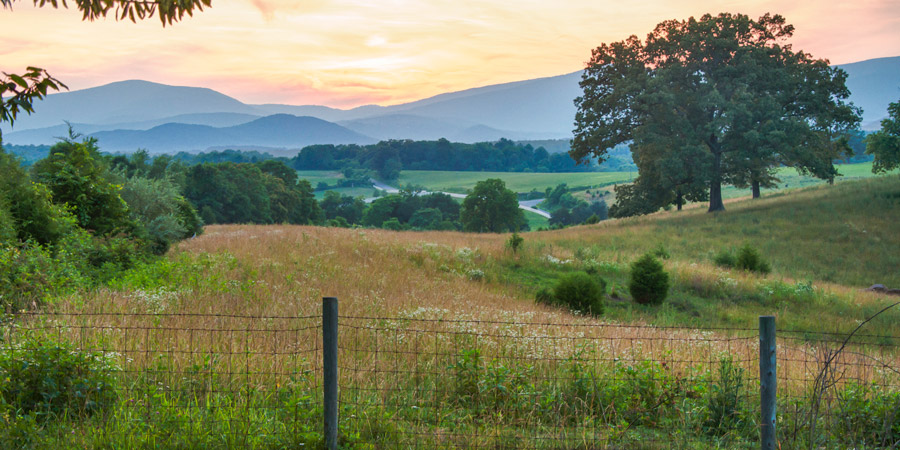 Photo by Patricia Temples
Photo by Patricia Temples
“Virginia. The very word conjures images of pastoral beauty. There are special places here, special lands that have witnessed America’s greatest human triumphs and tragedies. Our state’s open spaces, farms, areas of cultural significance, parks and battlefields inspire and attract people from around the globe. More than eight million now call the Old Dominion home. And Virginia’s natural habitats, some found nowhere else on earth, are home to some pretty special plant and animal inhabitants as well.
In 1999, the General Assembly and the governor established the Virginia Land Conservation Foundation to help fund protection of these resources. Grants are awarded to help fund the purchase of permanent conservation easements, open spaces and parklands, lands of historic or cultural significance, farmlands and forests, and natural areas. State agencies, local governments, public bodies and registered (tax-exempt) nonprofit groups are eligible to receive matching grants from the foundation for state-funded grant rounds.” ~Virginia Department of Conservation and Recreation
Talking Points:
- VLCF provides state matching grants on a competitive basis for the protection of open spaces and parks, natural areas, historic areas, and farmland and forest preservation.
- VLCF leverages local, federal, and private investment for natural resource conservation by paying no more than 50% of the project costs (state agencies are not required to provide a match).
- At least 50% of funding must be used for projects with public access.
- Projects are weighted on criteria such as a priority in Virginia Outdoors Plan or local comprehensive plan; water quality value; and public access. Projects receive more points if they provide riparian buffers.
- Since first receiving funding in FY2000, the Foundation has held twelve grant rounds. During those twelve grant rounds, VLCF received 337 applications requesting almost $123 million in state funding, which was almost two-and-a-half times the available amount. From 1999 to 2017, VLCF has awarded funding to 203 of the 337 grant applications, awarded more than $50.9 million to land conservation projects, and helped protect more than 63,800 acres.
- The unfunded projects represent a lost opportunity for the Commonwealth to capture an estimated $60 million in federal, local, and private matching dollars for land conservation.
- HB 1398 (2013) amended § 58.1-512(D)(4)(c) to establish a yearly target for the Virginia Land Conservation Foundation of $16M per year. The purpose of that legislation was to increase funding available for the highest priority projects, particularly those that provide public access for Virginia’s citizens and visitors.
What’s the ask? The Governor’s introduced budget only included $4.5 million per year for Fiscal Years 2019 and 2020. Please support full funding for VLCF at $16 million for Fiscal Year 2020.
Farmland Preservation Fund and Purchase of Development Rights (PDRs)
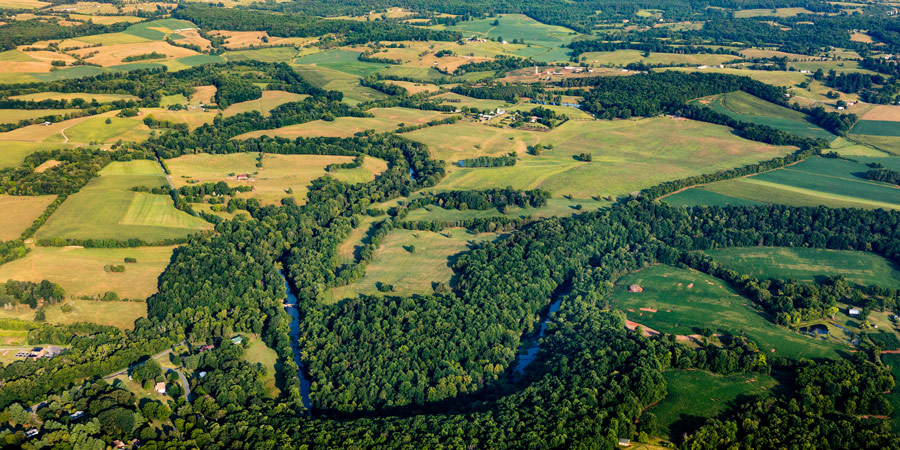 Photo by Will Parson, Chesapeake Bay Program.
Photo by Will Parson, Chesapeake Bay Program.
Early in Virginia’s history, land devoted to farming and forestry covered most of the state. Virginia saw a significant loss of farmland in the second half of the 20th century and into the 21st century including a loss of a half million acres between 2002 and 2007.
Recognizing the significance of the loss of agricultural land and the negative impact it would have on the state, the Virginia Farmland Preservation Fund was established in 2007 to provide grant funding to localities with certified farmland preservation programs. The program requires counties to match dollar for dollar the amount that is granted to them by the Commonwealth. In FY 2018, localities pledged $18.27 million in matching funds, over 73 times the $250,000 budgeted by Virginia.
What is the ask? Fund the Virginia Farmland Preservation Fund at $2 million a year — as reflected in 88 #1H by Sponsor Gooditis.
Agricultural BMP Cost-Share Program
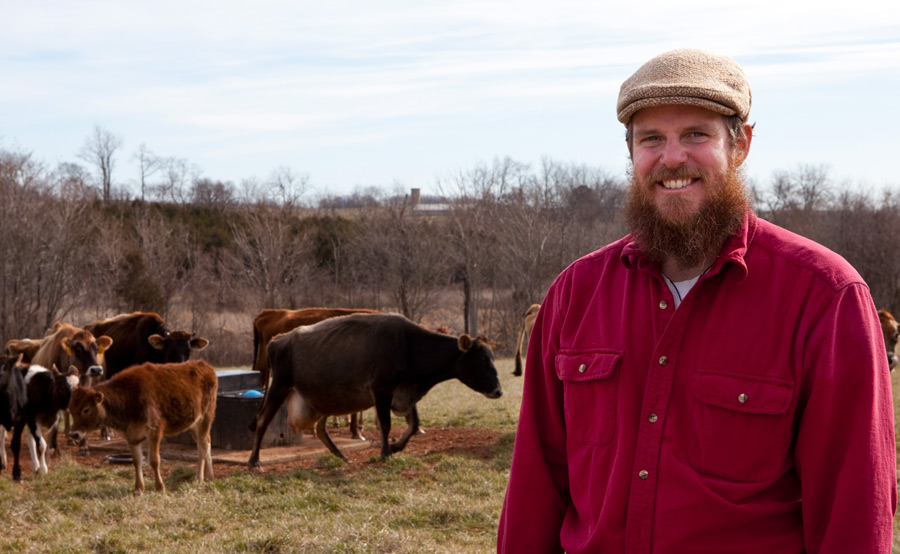 Culpeper farmer Terry Ingram. Photo by Katherine Vance.
Culpeper farmer Terry Ingram. Photo by Katherine Vance.
“Excess nutrients in runoff are a major threat to water quality. When it rains, the rain can cause erosion, pick up nutrients and chemicals, and run off into our waterways. On land, these hitchhikers help us grow crops and have nice lawns, but in runoff they sicken streams, rivers, lakes and bays. Nutrients can lead to harmful algal blooms that kill underwater plants and destroy habitat that aquatic life needs to survive. They can also lead to water with little or no dissolved oxygen, again to the detriment of aquatic life that is our food source.
While there are many sources of non-point source pollution, agriculture is among the most significant in Virginia because many acres here are devoted to farming. For example, one EPA study estimates that 27 percent of the phosphorus and 60 percent of the nitrogen entering the Chesapeake Bay originate from cropland. These pollutants need to be controlled to protect the environment.
The cost-share program supports the use of various practices in conservation planning to treat cropland, pastureland, hay land and forested land. All practices in the program have been included because of their ability to improve or protect water quality. Many will also increase farm productivity by conserving soil and making wise use of fertilizers and other farm resources.” ~Virginia Department of Conservation and Recreation
Both the Senate and House support funding for the Commonwealth’s agricultural cost-share program, with several members introducing legislation to increase and provide stability to the state’s agriculture cost-share program. More detail >>
Talking Points
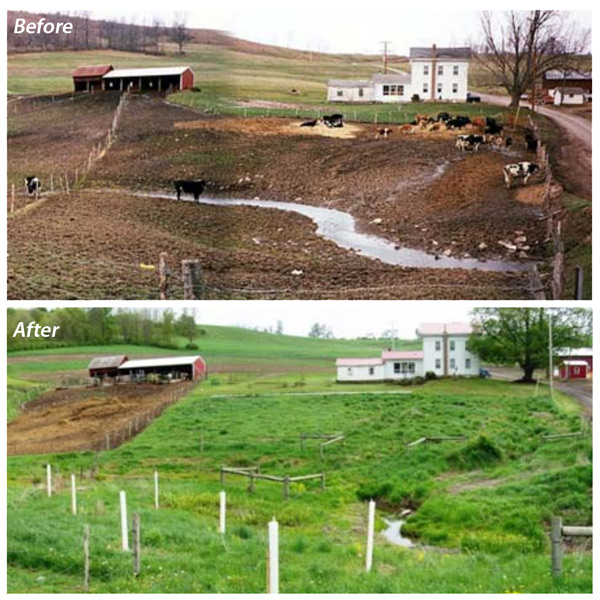
Provided by the Chesapeake Bay Foundation:
- The agricultural cost-share program helps farmers put in place practices like fencing cattle out of streams, planting streamside trees and grasses, implementing nutrient management plans, and others. These practices are the most cost-effective steps Virginia can take to restore the Bay and local streams under the Chesapeake Clean Water Blueprint.
- In addition to leading to cleaner water, investments in these practices create jobs and help local economies. A network of small businesses benefit when a farmer installs one of these projects—from contractors to lumber yards to tree nurseries.Studies have shown that implementing farm conservation practices at levels necessary to restore the Chesapeake Bay would create nearly 12,000 jobs and that every $1.00 invested in Bay restoration will generate $4.00.
Battlefield Preservation Fund
Virginia has witnessed multiple wars and conflicts, including the Revolutionary War, War of 1812, and the Civil War. With battlefields scattered across the Commonwealth preservation of these sites is a challenge. Virginia has more battlefield land than any other state, providing excellent opportunities for the development of heritage tourism and outdoor classrooms for our youth to learn the history of the nation and the Commonwealth. Support for the VBPF is the best way to meet this challenge and to take advantage of federal matching funds for battlefield preservation administered by the National Park Service American Battlefield Protection Program.
Talking Points
- Senator/Delegate, thank you for your support of battlefield preservation in the Commonwealth. I strongly urge you to support Budget Amendments 374 #2s patroned by Senator Vogel and 374 #1h patroned by Delegate Knight and Delegate Landes, which would increase funding for the Virginia Battlefield Preservation Fund to $2.5M per annum.
- Without the Virginia Battlefield Preservation Fund, the high-priority properties it allows organizations like ours to protect could easily be lost forever or irreparably harmed due to development.
- The benefits of VBPF reach far beyond the safeguarding of hallowed ground. Preserved battlefields protect open space, serve as “outdoor classrooms,” and are economic engines for local economies, providing jobs and tourism dollars, and generating revenues for state and municipal government coffers.
- Preserved battlefields are also living memorials to the valor and sacrifice of all Virginians who have served honorably in our nation’s Armed Forces.
- Since VBPF’s creation by the General Assembly in 2006, appropriations to the fund have supported in excess of $16M in grant awards, helping to save nearly 9,000 acres, valued at more than $80M – a 5-to-1 return on the state’s investment. No other battlefield preservation program in the country can claim such a high and consistent success rate. VBPF continues to be a very successful program with a tremendous ROI for the state and I ask for your support in increasing funding this vital program.
What is the ask? The Governor’s introduced budget only included $1 million per annum for VBPF. Please support funding the Virginia battlefield Preservation Fund at $2.5 million per annum.
Brandy Station and Cedar Mountain State Park
State Senator Bryce Reeves, together with 10 bi-partisan co-patrons from across the Commonwealth, is championing a proposal to transform more than 1,000 acres of historic battlefield land in Culpeper County into Virginia’s next state park. This acreage includes not only the site of Culpeper’s first and bloodiest Civil War clash at Cedar Mountain, but also Brandy Station, site of the largest cavalry battle ever fought in any war waged in the Western Hemisphere. This acreage, nestled between the Rappahannock and Rapidan Rivers, is home to some of the most picturesque landscapes in Virginia.
A state park encompassing these two battlefields would provide the Commonwealth with a unique opportunity to showcase our shared history, increase tourism, and promote outdoor recreation in a region currently underserved by the Virginia state park system. This amendment is revenue neutral and would create the park upon transfer of the land, at no cost, to the Commonwealth by the relevant property owners (Civil War Trust and Brandy Station Foundation).
What is the ask? Please support Budget Amendment 363 #4s to create a state park at Brandy Station and Cedar Mountain battlefields.
Virginia Conservation Assistance Program
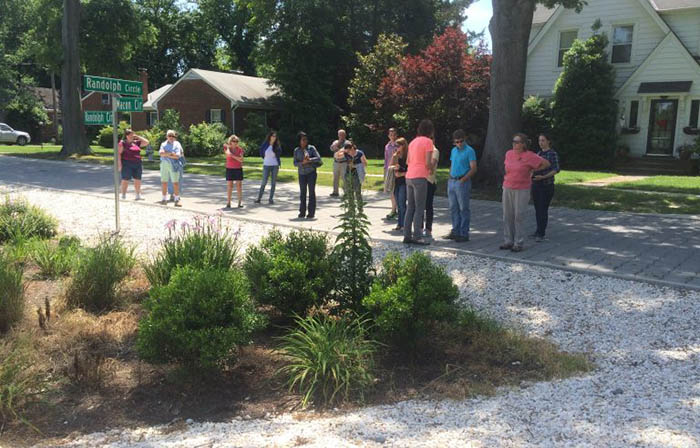
Public bioretention. VCAP photo by Virginia Soil & Water Conservation District.
“The Virginia Conservation Assistance Program (VCAP) is an urban cost-share program that provides financial incentives and technical and educational assistance to property owners installing eligible Best Management Practices (BMP’s) in Virginia’s Chesapeake Bay Watershed. These practices can be installed in areas of your yard where problems like erosion, poor drainage, or poor vegetation occur. Qualified sites shall be used for residential, commercial, or recreational purposes with a proposed practice that addresses a need.” ~Virginia’s Soil & Water Conservation Districts
What’s the ask? Please support budget amendments 362 #7h and 362 #8s to provide funding for the Virginia Conservation Assistance Program at $500,000 per year.
Talking Points:
- I strongly urge you to support budget amendments 362 #7h introduced by Delegate Rasoul and 362 #8s introduced by Senator Edwards, which would provide funding for the Virginia Conservation Assistance Program at $500,000 per year.
- As more natural landscapes are converted to impermeable surfaces or managed turf, stormwater moves across them, carrying pollutants such as sediment and nutrients to vulnerable streams and the Chesapeake Bay. VCAP is just one program that seeks to reverse that trend.
- Urban and suburban runoff is contributing to impairment and efforts to retro-actively address stormwater runoff from existing impervious surfaces is a priority. VCAP helps citizens of the Commonwealth be a part of the solution.
- The Virginia Conservation Assistance Program, provides financial assistance to homeowners for urban BMPs. Much like Agricultural BMPs, these measures help control and minimize erosion, conserve water within the landscape, improve riparian buffer areas, promote wildlife habitat, treat stormwater runoff, and among other things, improving water quality in our local streams and waterways.
